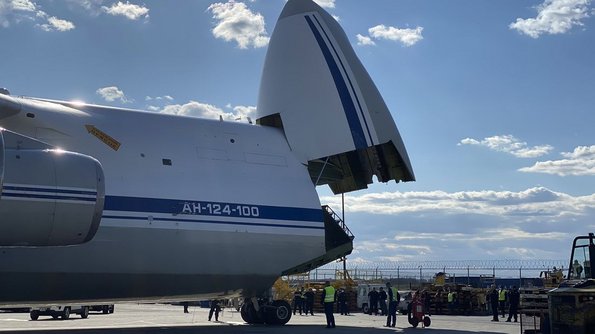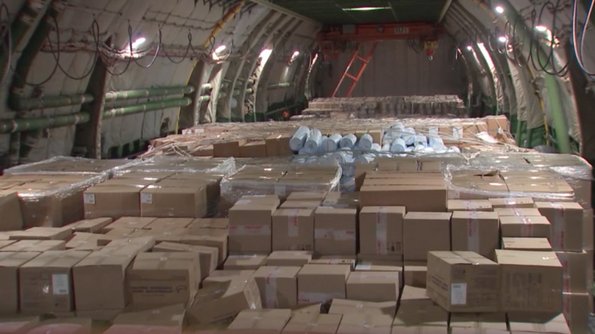Corona in Russia – two reports from the country
cc. The corona pandemic has spared no country. Russia is also affected. In many of our media the idea of Russia as bogeyman has unfortunately not yet been corrected. Two reports from Germans living in Russia may help to correct some prejudices. The two eyewitness reports are from March 17 and March 20. In the meantime, the situation in Russia has also deteriorated and the Russian government and the responsible regional and local authorities have taken further measures, which are very similar to those in our countries today.
Nizhny Novgorod
I, Siegfried Wilhelm, have been living in Russia for more than ten years and carefully keep up with what is happening.
At the beginning of January of this year, news broadcasts on Russian television spoke of a novel possible virus epidemic that originated in Wuhan. Immediately afterwards, controls were set up at the border crossings. Every traveller from the Wuhan region, later from China in general, was tested with thermal cameras and if suspected, i.e. at elevated body temperature, was committed into an isolation ward.
Transition points were closed and air traffic with China was completely shut down within a week. Isolation rooms have been established at the airports; travellers suspected of being infected have been committed to hospitals for infectious diseases. Some of them still had to be established, for example in sanatoria and similar institutions, among others in the Tyumen region.
The corona news occupy about 75 % of the news broadcasts on Russian TV stations. Anyone who is serious only takes to the streets wearing a mask, although these masks have now become rare. In January, Russia had sent one million masks to China as emergency aid. That was only the famous drop in the ocean, but still.
During this time, I particularly noticed that public transport and public facilities such as metro stations were treated with disinfectant. Specifically, the news showed how handrails were disinfected in the Moscow metro. This seemed unusual to me. According to the news, it should have happened also on busses etc. However, I cannot confirm it, because I did not see it myself.
Otherwise, measures against the spread of the virus are a regional matter. The governors of the single oblasts or heads of government of the republics have to decide locally what to do. On 16 March 2020, it was reported on television that a team of experts has been established with the government, including medical specialists, federal and regional representatives of healthcare, and other professionals. Several regions where infections have occurred have been declared as priority areas, including Nizhny Novgorod because of a case “imported” from Italy. It’s better to do too much than to little. The success proves this policy right. Here in Nizhny Novgorod there are now only two cases of infection, one came back from Italy, one from Germany.
In total, there were as many as two dozen infected persons in Russia over a period of several weeks. This week there was a huge increase, so that currently 219 people are affected, one death so far (as of 17 March 2020). The increase in the number of infected persons has concrete causes. It still affects returnees from abroad, primarily holi-daymakers from Austria, especially Tyrol, or from other Alpine regions, especially Courchevel – the winter sports paradise of those who do not belong to the underclass. The returnees are requested to stay at home in quarantine for 14 days, which is generally observed, with exceptions.
There are no supply bottlenecks – despite some prophecies of doom
I am not able to say to what extent military medical personnel are involved in the actions against the virus, as indicated by acquaintances. It is impossible by no means, but this has to be decided always on the spot. Anyone who now travels to Moscow from China or the countries of the EU and Scandinavia, including Switzerland, (this can only be done via Sheremetyevo Airport, rail traffic has been ceased) must first be in quarantine for two weeks, which can also happen at home if necessary. Schools and universities are closed until 12 April. Kindergartens are working at reduced capacity. Only children of people working in social priority areas (medical sector, nursing staff, and bus/tram drivers) will be admitted. Shops are normally open and normally stocked.
Siegfried Wilhelm,
Nizhny Novgorod, 20 March 2020
St. Petersburg
In Russia, life is still largely going its usual course. Although theatres are closed, concerts and sporting events cancelled and gatherings of more than 50 people are forbidden, apart from that, you hardly notice the virus in everyday life in Russia. With almost 200,000 tests carried out, Russia has only just under 650 infections. This is mainly due to the fact that Russia has reacted very quickly and, among other things, has closed its borders. Russians returning home from abroad (Russia has brought home over 40,000 Russians from abroad in the last ten days by special flights) have to spend two weeks in domestic quarantine.
But now the number of infected people is rising faster and faster, also in Russia. Yesterday the number was under 500, today it is already over 650. As a reminder: When Germany had this number of infected people at the beginning of March, there were practically no measures taken by the German government. By the way, Russia also reported the first two deaths from the coronavirus today.
Today President Putin addressed the Russians in a television speech and announced the measures that will apply in Russia as of Saturday, 28 March 2020. These measures include postponing indefinitely the referendum on the planned constitutional reform, which was to take place at the end of April.
From Saturday onwards, work in Russia will be largely suspended, rules will apply as on holidays, which means that people will not go to work, but salaries will continue to be paid. However, shops, banks, insurance companies, public authorities and public transport will continue to work.
The regulation will apply from 28 March to 5 April 2020, but I expect it to be extended or even tightened up by then, depending on how new infections develop.
Putin also has no illusions that Russia will be spared by the epidemic. He said it very clearly: “The work-free days have been decided with the aim of slowing down the spread of the disease.”
In Russia, too, one is aware of the fact that there is no way to stop the disease, but at best to delay its spread. By the way, it is remarkable that I have not yet seen empty shelves in the shops in Russia. There are corresponding videos from Russia, but I went shopping yesterday, and at least in my supermarket around the corner everything was there, the shelves were full.
In his speech, Putin announced a programme to support people and the economy. All social benefits that people receive are to be extended by six months in a lump sum, without the usual applications or documents having to be presented. In addition, a kind of special child benefit of 5,000 roubles (about 60 euros) per month will be paid for three months. And also the increase in family support announced by Putin in January, which was to be paid out from July, will now be brought forward by one month and paid out from June. Since these funds are paid retroactively from January, families with children will receive a quite respectable sum in June.
In addition, the sick pay is now to be calculated differently and increased. In Russia, sick pay is calculated using a formula that takes into account the amount of the salary and the years of employment, which means that sick pay for young people is often very low. This should now be increased and may no longer be below the minimum wage. The unemployment benefit will also be increased by half, because these days people are losing their jobs in Russia as well and it is of course almost impossible to find a new job, at least for the moment.
There will also be help with loans. If a person’s income falls by 30% or more, the banks will be instructed to defer the instalments for loans. This applies to all types of personal loans, whether consumer loans or mortgages.
Small and medium-sized enterprises do not have to pay taxes other than value-added taxes for six months. The same applies to social security contributions, which in Russia – unlike in Germany – are paid solely by the employer. In addition, social security contributions will be cut in half across the board; previously they were 30%, but now they are only 15%. This measure is valid indefinitely. In order to prevent companies from going bankrupt because of the crisis, no outstanding debts will be allowed to be legally collected for six months.
But Russia is also using the situation to raise other taxes. This involves funds that flow out of Russia in the form of dividends and profit distributions. Up to now, only two percent tax has been due on these. In Russia, the income tax is a flat rate of 13%, so from now on a 15% tax will be due on profits transferred abroad. However, in many cases this affects double taxation agreements with other countries. Putin said: “If our foreign partners do not accept our proposals in this regard, we will withdraw from the double taxation agreements with these countries.”
On the second new tax, Putin said: “In many countries of the world, interest income earned by individuals from bank deposits and securities is subject to income tax. We do not tax such income. I propose to set a tax on interest income at 13% for citizens whose total volume of bank deposits or investments in debt securities exceeds one million roubles (about 12,500 euros). That is, I repeat, not the contribution itself, but only the interest earned from such investments will be taxed on the income of individuals.” The additional income from these measures will be used to counter-finance social security contributions.
Thomas Röper,
St. Petersburg, 25 March 2020
Source: https://www.anti-spiegel.ru/2020/fernsehansprache-von-putin-zum-coronavirus-welche-massnahmen-die-russische-regierung-ergreift/ on 25 March 2020
(Translation Current Concerns)
Russia sends coronavirus aid to the US
Russia sends medical supplies to combat the corona pandemic in the US. According to the news agency Interfax, Kremlin spokesman Dmitry Peskov said that President Vladimir Putin offered the help with regards to the terrible situation in the US. Donald Trump accepted it. A plane with medical supplies should take-off the very same day. For the second time during the corona crisis, Russia supported a country which is a member of NATO. Earlier it sent medical and personnel assistance to Italy.
Source: https://www.mdr.de/nachrichten/panorama/ticker-corona-virus-dienstag-einunddreissigster-maerz-100.html on 31 March 2020

